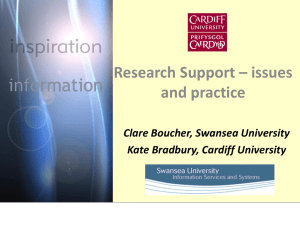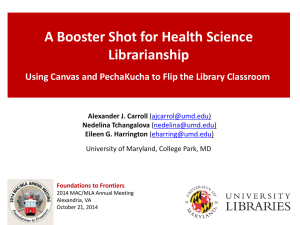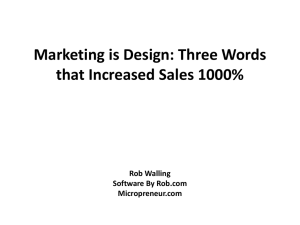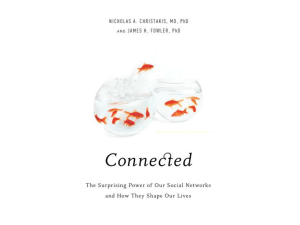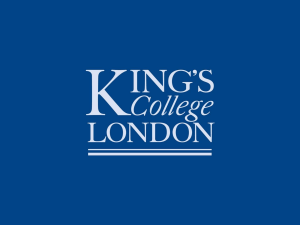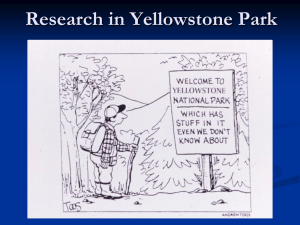LIBER-RDM-Data-Typology-V31
advertisement
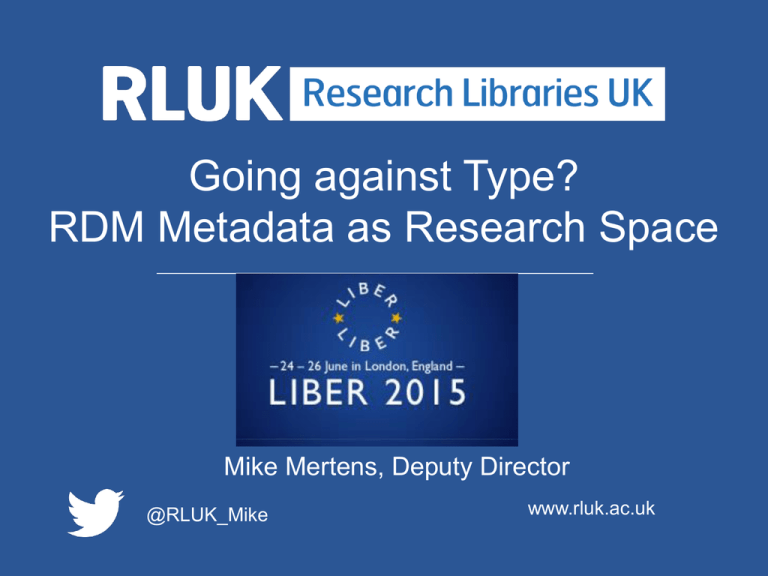
Going against Type? RDM Metadata as Research Space Mike Mertens, Deputy Director @RLUK_Mike www.rluk.ac.uk Overview • Reasons for undertaking the work • Go from top-down to bottom-up • Understanding impact of specific investments in RDM • Scoping future needs • Data evolves with disciplines • New staff competencies • Why a data typology approach? • Researcher-centred • Librarian; goodbye mandates, hello data • From curated to automated metadata • Refining the library’s role Research libraries are and wanting to provide services to researchers to meet the developing requirements of funders and secure research integrity but this is not a static area • Data and liaison librarians need help in building an understanding of: • The value attached by different groups of researchers to data • The implications of these differences with regard to how researchers work • Key challenge: huge variety of different kinds of data in different disciplines and sub-disciplines, which also shift and change • Granular and specific discipline information needed for: • • • • • • Managing data Data curation Discoverability Sharing data Developing staff skills Cost & impact of support • Relatively more work has been done with the first four aspects in mind but two of the outstanding issues for services is how to forecast cost and forward plan for support skills. Further RLUK Drivers: • • • • • Provide therefore more direct and immediately meaningful opportunities to build networks with academic colleagues The resource should go beyond simply listing data types but allow rapid and precise orientation for those in support roles • “!’m interested in Discipline X. What is the data environment there? Are there any further sub-disciplines, is there crossover with other disciplines?” Keep track of how researchers’ changing methodologies effect changes in data types and formats used The resource should be open to community editing and augmentation constantly evolving Record links between established data repositories, metadata schema and thesauri used by different disciplines and the data types the latter produce “Research leaders should...adopt robust approaches for planning and costing data management and sharing plans” RLUK felt that there was a role for libraries here in providing the information that would go into such costings as well as generally support data librarians Method: • A series of focus groups with researchers in different disciplines to test and refine the initial typology based on desk research, and to examine and identify in such issues as: • The volumes and proportions of the different kinds of data they gather and create • The stages in the research process at which different kinds of data are produced, and how they are handled • The value they attach to data of different kinds, both during the research process and beyond any particular project • Attitudes towards data sharing and openness for different kinds of data. The Background Work: the Dimensions of Data Typology: • • • • • • • Experimental, observational, survey, models, simulations etc. Raw or analysed (and to what degree) Numerical, text, audio, image etc Contextual data relating to provenance, machine and sensor settings etc. Software, formats and standards Ethical and legal issues Data ownership http://users.ecs.soton.ac.uk/cjg/rluk/ “The Organization Profile Document is a way for an organization to make 'expected' open data sources/API discoverable. You can guess that a university has a certain things, like a publications database, a news RSS feed etc. It's creating a formal way to discover those so we don't have to depend on curated catalogues (probably not a safe thing to say to a Librarian!). I strongly believe that we need to encourage the use of the Web as a complement to catalogues.” With thanks to: John MacColl, Chair, RLUK and University Librarian & Director of Library Services, St Andrews University Stéphane Goldstein, Research Information Network Chris Gutteridge, Technical Administrator, UK Research Data Community Wiki, University of Southampton John Kaye, Senior Jisc Co-Design Manager Images: “Here's The Thing...Amagoop”, JD Hancock https://www.flickr.com/photos/jdhancock/16258886941/ “How to get the most out of your data, and why it matters, UCL, https://www.ucl.ac.uk/reward/reward-events-publication/nov_workshop.png Gout: monosodium urate crystals in joint fluid, Ed Uthman, https://www.flickr.com/photos/euthman/501118522 Hubble Probes Comet 103P/Hartley 2 in Preparation for DIXI flyby, NASA Goddard Space Flight Center, https://www.flickr.com/photos/gsfc/5056694893 Robot army: They're coming to getcha, Peyri Herrera, https://www.flickr.com/photos/peyri/10207629/ Thanks! Questions?
